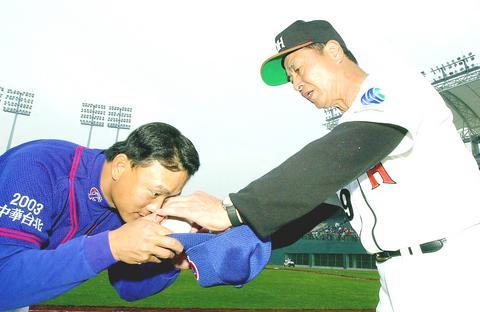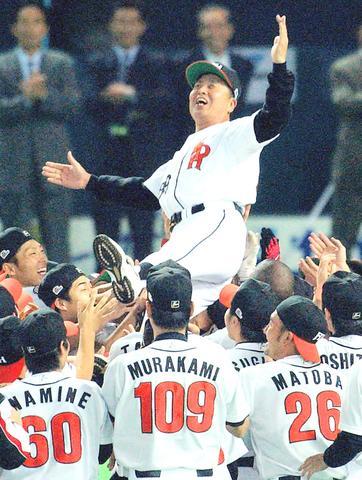Sadaharu Oh (
Oh holds the world record for the most home runs ever hit as a professional, with a tally of 868. He is also most known for his unique "scarecrow" position when batting -- he raises his right foot and stands only on his left when hitting the ball.
He was the Yomiuri Giants' third bat during their glorious V9 period from 1965 to 1973, when the Giants won the Japanese championship for nine consecutive years. Shigeo Nagashima, his archrival, was the fourth bat in the team.

PHOTO: CHANG CHUNG-YI, TAIPEI TIMES
The third, fourth and the fifth bats are the top sluggers in a team. Of them, the fourth is considered the best.
As a coach, he has won a league championship with the Giants, and three league championships, including two Japanese championships, with the Daiei Hawks.
Oh was born on May 20,1940 in Japan. Oh's father, Shifuku Oh (

PHOTO: REUTERS
"Oh's father had a strong love for China and carried a PRC passport. Yet he was worried about the unpredictable fate of the "two Chinas" and therefore got ROC passports for his children," said Li Shu-fang (李淑芳), a Taiwanese baseball commentator specializing in Japanese professional baseball.
"Oh has kept the ROC passport all his life because he thinks it is important to be a dutiful son and guard his father's ideal of not forgetting one's roots," Li said.
Oh cares a lot about Taiwan and its baseball. He would give guidance to the Taiwanese national team and players whenever possible. He also made it possible for the Daiei Hawks to play its regular in-season game against Orix Blue Waves in Taiwan last year as well as exhibition games with Taiwanese teams this year. When the Taiwan national team participated in the 2003 Asian Baseball Championship this month, the team was able to train in Fukuoka Dome, the Hawks' home base, with Oh's help.
Because of his influence in both Japan and Taiwan, Oh was appointed as ambassador without portfolio by President Chen Shui-bian (
Yet Oh's identity as a foreigner has disadvantaged him during his career.
Li pointed out that as early as in high school, Oh was prevented from participating in a national sports event because of his nationality.
Then, during Oh's time with the Yomiuri Giants from 1959 to 1980, he was the teammate of the much respected Japanese player Shigeo Nagashima. According to Li, although Oh often outperformed Nagashima in personal records, on at least two occasions Nagashima was chosen as the most valuable player at the end of the year although he had a poorer record than Oh.
Japanese people still consider Nagashima as Japan's real "Mr.Baseball," simply because he is well received as an authentic Japanese, while Oh is seen as somewhat of an outsider.
When Oh retired as a player in 1984, he took over the position of head coach of the Giants. With struggles among internal factions and because the Giants were a team with too glorious a past, Oh's only winning a league championship once during his five-year reign was heavily criticized, especially by his long-time rival Nagashima.
"Oh never cared about these things since he understood that it would be like this with his nationality, and it was always Nagashima who cared more about the competition between them," Li said.
Tsai Jung-lang (
"Oh is a humble person and he does not act like a star. He once told me that after he retired from professional baseball, he would devote himself to teaching children baseball and helping children who love baseball make their dreams come true," Tsai said.
"Oh is also a very disciplined person. For example, during the training period he would not allow himself to drink. If the training finishes tomorrow and he dines with friends today, he would not take a drink."
Lu Ming-shih (
"When I was experiencing a low point in my life, he comforted me and told me not to be pressured too much. He even brought me nutritious food at the time," Lu said.
"He is `yasashi' [Japanese word for gentle and caring], and he does not have an attitude like many superstars do."
Lu said that Oh also achieved a high status in Taiwanese baseball circles and Taiwanese baseball players admire and respect him.

Alain Robert, known as the "French Spider-Man," praised Alex Honnold as exceptionally well-prepared after the US climber completed a free solo ascent of Taipei 101 yesterday. Robert said Honnold's ascent of the 508m-tall skyscraper in just more than one-and-a-half hours without using safety ropes or equipment was a remarkable achievement. "This is my life," he said in an interview conducted in French, adding that he liked the feeling of being "on the edge of danger." The 63-year-old Frenchman climbed Taipei 101 using ropes in December 2004, taking about four hours to reach the top. On a one-to-10 scale of difficulty, Robert said Taipei 101

Taiwanese and US defense groups are collaborating to introduce deployable, semi-autonomous manufacturing systems for drones and components in a boost to the nation’s supply chain resilience. Taiwan’s G-Tech Optroelectronics Corp subsidiary GTOC and the US’ Aerkomm Inc on Friday announced an agreement with fellow US-based Firestorm Lab to adopt the latter’s xCell, a technology featuring 3D printers fitted in 6.1m container units. The systems enable aerial platforms and parts to be produced in high volumes from dispersed nodes capable of rapid redeployment, to minimize the risk of enemy strikes and to meet field requirements, they said. Firestorm chief technology officer Ian Muceus said

MORE FALL: An investigation into one of Xi’s key cronies, part of a broader ‘anti-corruption’ drive, indicates that he might have a deep distrust in the military, an expert said China’s latest military purge underscores systemic risks in its shift from collective leadership to sole rule under Chinese President Xi Jinping (習近平), and could disrupt its chain of command and military capabilities, a national security official said yesterday. If decisionmaking within the Chinese Communist Party has become “irrational” under one-man rule, the Taiwan Strait and the regional situation must be approached with extreme caution, given unforeseen risks, they added. The anonymous official made the remarks as China’s Central Military Commission Vice Chairman Zhang Youxia (張又俠) and Joint Staff Department Chief of Staff Liu Zhenli (劉振立) were reportedly being investigated for suspected “serious

Nipah virus infection is to be officially listed as a category 5 notifiable infectious disease in Taiwan in March, while clinical treatment guidelines are being formulated, the Centers for Disease Control (CDC) said yesterday. With Nipah infections being reported in other countries and considering its relatively high fatality rate, the centers on Jan. 16 announced that it would be listed as a notifiable infectious disease to bolster the nation’s systematic early warning system and increase public awareness, the CDC said. Bangladesh reported four fatal cases last year in separate districts, with three linked to raw date palm sap consumption, CDC Epidemic Intelligence